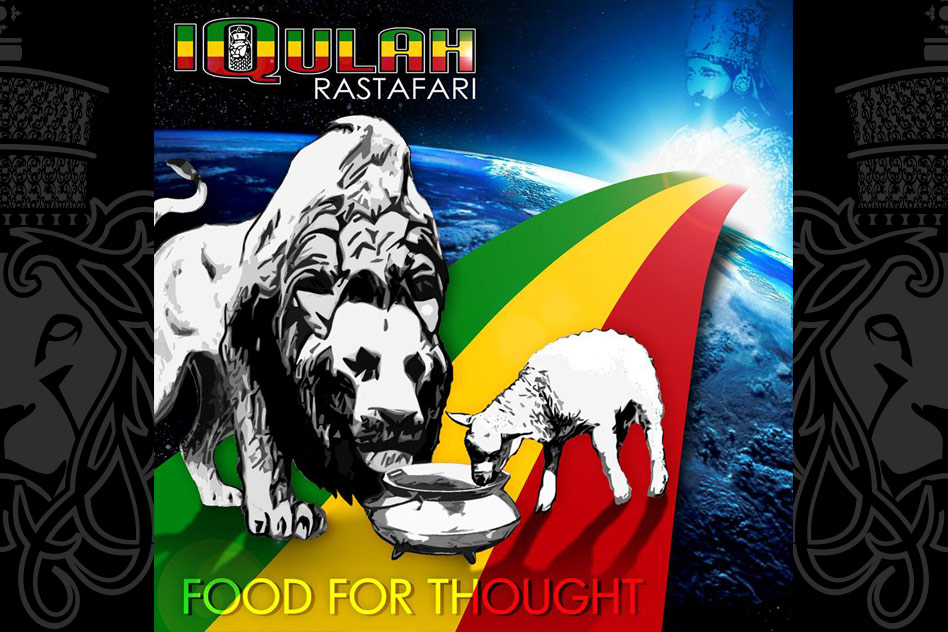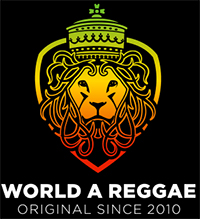Hot off the mixing desk, ‘Food for Thought’ by Jamaican born IQulah Rastafari graced airwaves recently globally and started to get a reaction. What could we expect from the man who brought you ‘Rasta Philosophy’ with his Gideon Band in 1984 and the pioneering 1993 album ‘The Mission’ and also who’s name, broken down means Integrity, Quality, Unity and Love for Africa as Home, which may reflect in the music of this new album.
At a time when reggae music is divided between the upcoming youth with politically messages and the veterans of the scene still delivering their positivity, it is difficult to be different in the current climate. World music artists such as Lëk Sèn and Alpha Blondy have been successful by recently releasing music that integrates different sounds and cultures resulting in a unique concept of sound.
As many Reggae artists have to do, to make a name for themselves. IQulah spent many years on the road, performing in Africa in the late 1990s spreading his music. IQulah Collaborated with the band members of local roots reggae outfit by the name of ‘Azania’. Azania has been consistent in their works and has produced several albums over the years, recorded at Ghetto Sound Studios in Nyanga. Azania’s main passion however, is that of which many artists in the current reggae climate share, and that lies in giving music to the people of the world and sharing the Rastafarian beliefs of peace, love and unity.
IQulah created his own label by the name of Mozziah, the main purpose being he could release a number of 7inch records to kick-start his musical career in Jamaica. More and more artists in Jamaica are starting their own labels to have control over their music; a prime example is Junior Reid and his JR Productions. IQulah isn’t scared of collaborating or working with other artists. ‘Rasta philosophy’ featured Marcia Griffiths and Judy Mowatt on harmonies; it will be interesting to see who should appear on ‘Food For Thought’ if anyone.
 IQulah broke many barriers with his live performances and became the first Jamaican reggae band to perform in Estonia, Russia. IQulah’s highest elation was when he performed in Maskal Square, Ethiopia in front of 80,000 people in 1997. In 2004, we saw the previous album from IQulah by the name of ‘Rastafari 4 Eva’. An album filled with strong messages and positivity.
IQulah broke many barriers with his live performances and became the first Jamaican reggae band to perform in Estonia, Russia. IQulah’s highest elation was when he performed in Maskal Square, Ethiopia in front of 80,000 people in 1997. In 2004, we saw the previous album from IQulah by the name of ‘Rastafari 4 Eva’. An album filled with strong messages and positivity.
To start proceedings, track one is entitled ‘Back In The Day’. Instantly we are greeted with authentic bongo style drums and a brass arrangement of horns that set the tone for a rustic real conscious roots record. The grittiness of IQulah’s voice chants positivity on a bed of light harmonies from backing singers to create a harmonious feel. “ Before the race start, I know victory is mine” chants IQulah, we should take this as a warning for the rest of the album if consistency is apparent throughout, a great good vibes record to set the tone of the album.
Following is Jail Breaker. We’re greeted by some drum rolls and toasting from IQulah, “ Jam Rock is a Jailhouse” sings IQulah, the song expresses negativity experienced or witnessed by IQulah with mentions of Politian’s. A great hook on this song that will stick in your head, “ Better to be a jail breaker than a heartbreaker”. All in all, an easy listening record with a solid drum and keys arrangement.
Third Track in is “ Generation”. We’re greeting with some strings and a whimpering guitar with another strumming the roots riddims to set the tempo. IQulah chants throughout a chain of negative impacts that occur in today’s society, which results in the message of problems continue from generation to generation. Although musically not musically thrilling, the message of the record is clear and strong and IQulah delivers with passion.
The Next Track is ‘It Is I’. The horn section is back, with solid drums and back to the authentic roots sound. The riddim I very catchy and will possess you to sway or nod you head. Strong messages of Rastafari in this record, IQulah seems to confess that it is him that has asked for various things such as lightening and thunder and liberating freedom fighters. The hook on this record will definitely stay in your head for the rest of day “ it is I, I & I Oh Jah Jah, it is I, I & I oh saviour”. Towards the end of the record there is a small section of stripped back dubbing with echoes and splashes that add something different to the record to make it exciting.
Tormented Souls is a stripped back record with a jazz influence. Greeted with a Gerry Rafferty Baker Street sax creating an ambiance. “ See tormented souls drinking alcohol, I’ve seen tormented souls taking their cocaine, I’ve seen tormented souls go down the drain. Who is to be blamed?” Such a strong question after what feels like personal grief of experience from IQulah. African style drums create a marching style riddim, whilst IQulah chants “ Tormented Souls”. A serious record by IQulah here, following the previous records which are of positive nature, a vast contrast but non-the less a meaningful record with a thought provocative message.
Half waypoint, Track 6 and we know about the passion for Rastafari IQulah supports, we’ve also discovered some positivity and some great constructed riddims. “Strength Of Life” We are back to a moody riddim, slightly upbeat but with temperament. IQulah chants “Strength of life” throughout preaching Rasta with mentions of Ethiopia and Rasta being the strength of life.
‘She’s always there’ something fresh! An upbeat Ska tempo and feel to the riddim. Its great that there has been a gear change in the album as riddims were starting not to sound so different from one another. The vocals reflect flashbacks of listening to old soul or Motown records, with passionate lyrics and extended delivery. Not quite the Skatalites but a section to be enjoyed is the trumpet style solo towards the end.
 ‘Judgement’ Back to the Bond style violin beginning to the record and back to the conscious roots. ‘She’s Always There’ was a nice break but we come back down to foundation’. IQulah preaches the might’s of Jah and Rasta over soft drums and a wandering guitar solo. A nice record but very similar to previous records, the Ska style track really gave the album the lift it needed but over half way in, doubts of repetition loom.
‘Judgement’ Back to the Bond style violin beginning to the record and back to the conscious roots. ‘She’s Always There’ was a nice break but we come back down to foundation’. IQulah preaches the might’s of Jah and Rasta over soft drums and a wandering guitar solo. A nice record but very similar to previous records, the Ska style track really gave the album the lift it needed but over half way in, doubts of repetition loom.
Track Nine, ‘Hail Fari’, a nice record in which an uplifting roots rift carries you throughout accompanied by the soulful voice of IQulah. This track has a great brass section and is very positive with a great hook; you could imagine many waving arms and adoring fans singing along to this record at a festival.
Coming up to final straight of the album, track 10 ‘Grown Man Cry’. We’ve gone back to a sound similar to Tormented Soul, African style tribal drumming with a stripped back authentic sound accompanied by a sax/flute generating a sense of calm with the record. Mentions of Jah and the praise of Rasta are very much apparent in this record with lots of positivity.
Final two tracks, ‘No War’. Drum roll on the start. There’s a ‘Specials’ feel with this song, the keyboard is apparent throughout that of most of the ‘Specials’ records such as ‘Friday Night Saturday Morning’. IQulah suits the Ska sound and tempo and has a great voice and tone to suit. A simple but effect song with a strong message leads us to the last record.
The final record of the album is ‘Liberation’. IQulah has chosen a striped back record with minimal instruments with an influence of African music and a sense of use for African instruments. There are angelic harmonies in this record, probably one of the best of the album. The message in this record is the struggle to be liberated, IQulah tells gives us advice and positivity, a great way to end the album, there’s also a touch of Robert Nesta in the delivery of lyrics also.
Overall, The album is solid, with clear meanings and messages of positivity. IQulah clearly has written lyrics from his heart and mind and the music reflects this. Some tracks riddims can appear somewhat repetitive, but the lyrics are the separation and distinctiveness that divides them. In contrast to the youth of reggae today, this album is very much focused on Rasta and peace where the music coming out of Jamaica in this instance, today, is political led and encouraging youth to have faith. Lots of thought has gone into this album as well as time and experience and it has have paid off for IQulah.
By Liam Monaghan





